Pete Townshend / The SDE interview
“My solo career was a mistake”
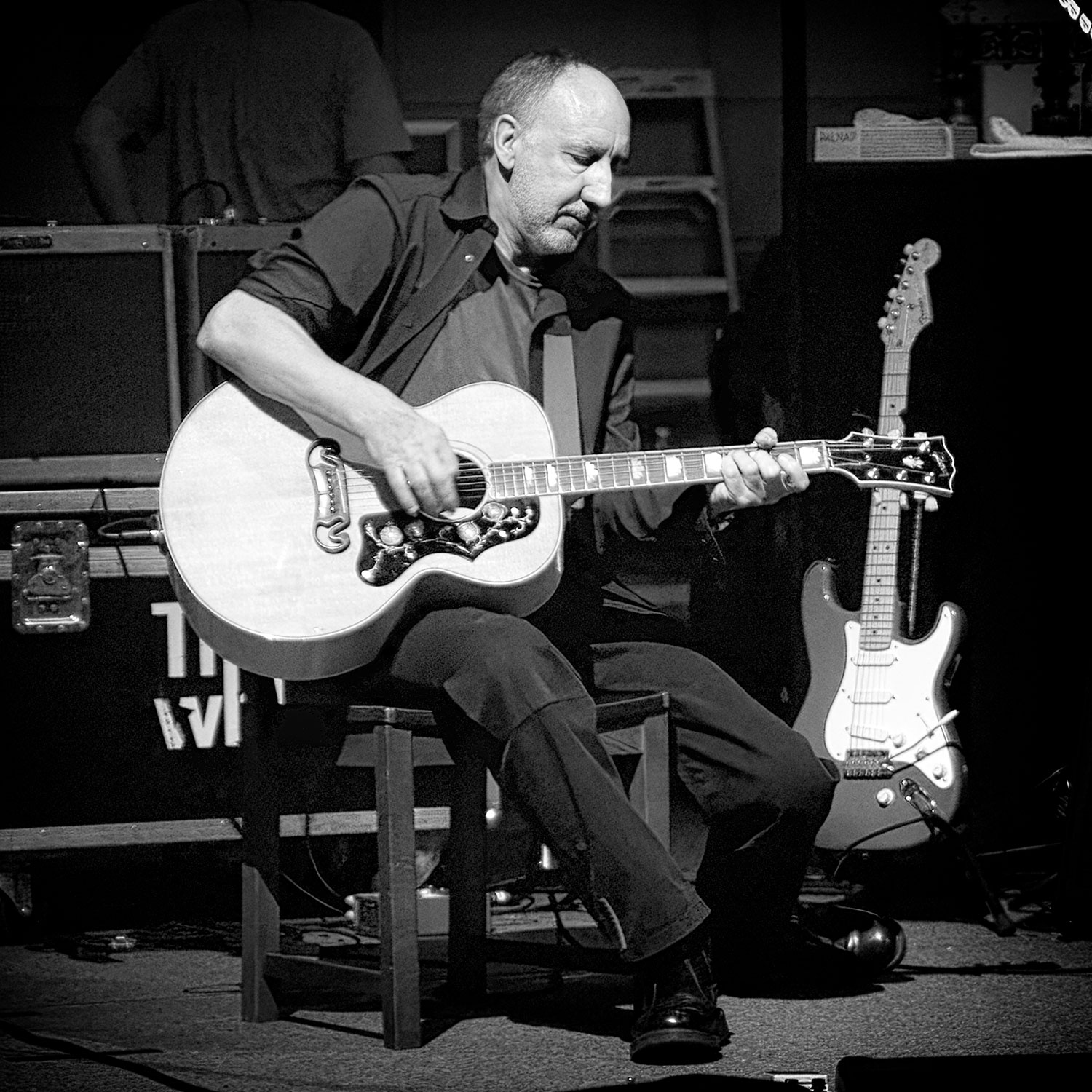
Who legend Pete Townshend’s solo career mostly spanned the 1980s and crept into the early 90s, with 1993’s Psychoderelict being his last studio outing. Throughout this period Townshend played live as a solo artist infrequently, but some rare performances are now documented in a new CD box set: Live In Concert 1985-2001. Pete recently sat down to discuss the box set, and this era, with SDE, and also talks about the next Who box set, his thoughts on reissues in general and immersive audio (and the work of Steven Wilson).
SDE: Universal Music have been focusing on your solo career recently, Pete, because they’ve been doing the half speed vinyl remasters, and now we’ve got this live box set. Are you pleased to see the spotlight fall on some of your solo work after so many Who reissues over the years?
Pete Townshend: When you put it like that, I suppose, yes. It’s interesting because my relationship with Universal is a good one. I really love everybody in the company from the top down. And they acquired The Who catalogue a while ago, and they acquired my catalogue subsequently. And in that acquisition, in the contract, they insisted on including some of the demos or some unreleased material, but certainly all released material that had been included in Eel Pie releases, or whether it was released online, or whatever. And I thought, that will just be because they want to put it in a shed and keep it, just in case it ever gets used in a movie, but in fact they’ve actually supported it, which means, of course, that it has more chance of getting used in a movie. So I’m really pleased about it. But it’s been a bit of a surprise.
How involved do you get in a project like this? Has this been on the go for a few years?
I can’t remember when I wrote the liner notes [Pete contributes an introduction] but I only got the box set a couple of days ago and I was surprised, reading Matt Kent’s writing [in the booklet] where it’s quite clear that I’ve done an absolutely huge amount of solo things. But that because I’m old… And in the first 35 years of my career, I did quite a lot of solo bits and pieces, especially charity stuff.
What was interesting with my notes – and I’ve obviously written those recently, [although] I can’t remember when – but that is very much where I am at the moment, I’m in two minds about my creative process, I’m in two mind about The Who’s final years, I’m in two minds about what I do with my time as I get older, you know, whether I spend it on charity, or social issues… I’m staying away from politics. It’s interesting, though, when you get involved in social issues, you know, whether it’s homelessness or, or, or domestic violence, or whatever it is, you get drawn into politics. But I’m trying to balance out where I am in my creative life, principally, and I think in the liner notes, I talk a little bit about not having been a particularly willing and happy performer. When you look at some other stuff that I’ve produced, such as the Deep End concert and the Hammersmith concert, I seem to be having fun, but I think I’ve always found a way of looking like I’m enjoying the job, when in actual fact it’s always felt like work, it has always felt like a job. And so for me now I’m kind of looking at how to get back to that place of, of creativity being principally play. I don’t want to over-egg this, but I do think it’s important and I’m almost at the point of starting an Instagram feed about ‘creativity is play’ because so many musicians make music and they struggle now with the fact that it’s almost inevitable that they’re never gonna make any money out of it. So they have to do it for love. So it has to be fulfilling, it doesn’t have to be fun, but it has to be fulfilling.
I read your notes and found them fascinating. They were very, very honest. And this whole idea of you not needing the adulation; the crowd cheering you on, and all that, that is very much the opposite of how people view your average rock star or musician. Where do you think that comes from? You make reference to your father being a musician in the notes…
I can only look at my childhood and my time with my dad being in a band and maybe getting a bit blase, I don’t know. But I think there’s more to it than… I think I’m in the wrong job. It’s a good job; it’s well paid, and I’m good at it, but it’s the wrong job. I should have stayed at art college. And then of course, once I was in The Who, I should have fucking stayed in The Who and not fucked around for 11 years, although I spent some of that time working at [UK book publisher] Faber and Faber [Townshend took the role of Acquisitions Editor in 1983], but I just feel I’m eccentric in this respect. I can remember Bob Geldof saying to me, before we went on stage at Live Aid that eight billion people were watching and I just remember saying to him, “Bob, I feel nothing” [laughs].
These CDs in this new box were out before, weren’t they? You sold the product directly through your website around 20 years ago, which is quite an interesting thing to do in the relatively early days of the internet. Did you did you enjoy that direct connection with fans and selling directly, without having a record company in the middle?
Yeah, I did. I liked the idea of having a website, I was the first, or one of the first to have a personal website, which I wrote on and posted notes on. And then my now wife, Rachel, started In The Attic [an early webcast/streaming show] and we started to do the first webcast shows. But you know, Paul, the thing was, the audience was really small. And so one of the things about it was that not just at the bandwidth limited it, but it was limited by the fact that it was just a core group of obsessive Who fans and fans of mine. And it became quite clear over a period of time that I was spending a lot of time and energy communicating with, and serving a very small group of people.
My experience with online stuff was ‘how do I fucking get this stuff that I’ve got here, out?’ So I decided just to make it myself. What the record company wanted from me, was a new dedicated solo album, and I think I was out of contract, right? I think my last album with Warner Brothers was Ironman, and then I was out of contract? And Ironman was a flop…
My solo career was a mistake, I shouldn’t have done it.
Pete Townsend
Those albums in the early 80s, such as Empty Glass… Did you not feel a sense of duty to get out on the road and play the songs to people so the album would have the best chance of commercial success?
Put like that, it sounds like a real fucking job, Jesus. Duty to go out and perform in order to make more money for the record company?
Well not make more money necessarily, but…
That’s what it is, you know. They’ve given me a big advance to take a chance on making a record hoping that it will sell lots of copies… But no, the record company, were pissed off that I didn’t tour particularly with White City [from 1984]. Rob Dickens [Chairman of Warner Music UK at the time] dropped me, dropped the album, because I wouldn’t tour with the band. I just didn’t fucking want to, you know, it wasn’t what I wanted to be doing. And my solo career was a mistake, I shouldn’t have done it. I couldn’t support The Who at the time, with compositions, so what the fuck was I doing? You know, at one point, I had two contracts, to make seven albums over five years, and that was the kind of place that Phil Collins was in at the same time, and he managed it. But I was working for a group who didn’t write any material, so I had to… anyway, blah, blah, blah. It’s not a ‘poor me’ story, it’s just the fact that the reality of it was impossible. And I wasn’t in very good shape. I was drinking a lot; my marriage was breaking up; I was overworked; and I had diversified my life too much. So around the time that The Who were making their last album, and I was working on Empty Glass, that album got the benefit of me being at the beginning of that piece of work, but very quickly, I ran out of inspiration. So the idea of touring on top of that, if I’d had to tour every album that I made in that period, there wouldn’t have been enough days…
It sounds like you did enjoy the process of having an outlet to write [non Who] songs and record them, but all the other stuff that goes with it, you weren’t really willing to sign up to?
It wasn’t so much of an unwillingness to sign up to it, I just think it was the fact that it was impossible to do – I didn’t have time to do it. I took on too much. I think Phil Collins’ situation was very similar. His career is a bit of a lesson, isn’t it? You know, at the height of his career, he was doing solo work and getting number one records and he was still touring with Genesis, and he was still doing recording sessions, playing with anybody that called him up. And he was anxious. He was the first kind of Dave Grohl model of ‘I will fucking never stop’, you know. And what’s interesting is watching some of the big artists at the moment, like Taylor Swift, Paul McCartney, Bruce Springsteen… I can’t quite work out what the fuck they’re doing; why they’re doing it? So that’s me. If I was interviewing them, I’d say listen, it’s all very well what you’re doing and it’s lovely to see how successful you are… but why?
I think maybe Paul McCartney is the opposite of you, Pete. He needs the adulation, he needs to be out there to be Paul McCartney.
Well, that’s a bit simplistic. I’m just going a bit deeper. I’m a friend of Macca’s and I adore him and I appreciate what’s going on with Bruce Springsteen and Taylor Swift and other people like them, like Dave Grohl, who’s a friend and I love what he does, but I don’t understand.
It’s a bit like, watching somebody like Jeff Bezos. What the fuck? WHAT THE FUCK? What are they doing? What do they do for fun? I’ve got a boat in the south of France, and I went to pick up a friend in Nice, in the harbour. And I think my boat is big. You know, I’m going in and I go into the harbour and we need special space. And his [Jeff Bezos’] number one yacht is in. It’s as big as a cruise ship. It takes up the whole of the commercial Harbour. And he’s not aboard! It’s got 45 people on board getting huge salaries just to make it ready for when he wakes up one day and persuades his new girlfriend, ‘shall we go to my yacht in Nice?’ Can we be arsed to charter a flight and sit on a plane so we can go and sit on a boat somewhere else which can only birth or anchor in a commercial Harbour? You know, with cranes and noise and everything else? What the fuck? I don’t get it. I just don’t get it.
Bruce Springsteen is about the fact that he loves his job. For me, with this box set, looking back at it, so many of the driving forces behind doing the work were a different kind of duty. It wasn’t a duty to the record company, it was a duty to the audience and to charities. About half of them are charity gigs – certainly, I never made any money.
Everyone can understand why people want to do things for charity, but you did it a lot, whether it’s Prince’s Trust or Rock for Jobs, etc. You didn’t make a big thing about turning up to do these things. That’s obviously been really important to you over the years.
Yeah, obviously. On the other hand, I could just be a girl who can’t say no.
When you have put on the shows, despite your reticence, they’re quite ambitious, such as the Psychoderelict tour and the Deep End band… I mean, that band wasn’t really around for long, but it must have taken a lot of work to put that together and rehearse for those shows?
Yeah, and that part of it was good. It was fulfilling. And I think without getting into… My tendency, as you probably know is to try to find answers to my own questions; that sort of self-analysis. I’ve been in therapy and I’ve done analysis and they haven’t come up with the answers that are required.
And you know if I’m going to ask that question of Bruce and David Grohl and Paul McCartney and Taylor Swift, I have to ask myself why would I even consider now doing another tour with Roger Daltrey – and I am considering it – why would I do that? What is in it for me, if it’s not about the money – and it’s not. There’s a sense that I might do it for the greater good. And in my case, I’m not saying it will make the world a better place [laughs], I’m saying that my friends are road crew, my guitar tech, my driver, my security guy… My family love to bring their friends to Who shows; it’s when I get to see my buddies because when The Who are performing, it’s well known that we’re there and people pop out of the woodwork of my past, and come to the shows and I get to see old friends. So that ‘greater good’ is a big pull for me. So I think when I’ve done stuff for charity, it will be because it’s the fabric of those charities have supported my emotional, private life.
With the Psychoderelict shows you played the whole record live and you had all the actors speaking on stage and all the rest of it. Why did you decide to take that on at that time?
I’d worked with Des McAnuff on the theatrical version of Tommy, which went on Broadway then [in 1993] and I felt that, through my time at Faber, I had a grasp of musical theatre, and so I was thinking about trying to make something that would be a definitive rock theatre musical, but in a sort of a noir way. It turned out to be quite comedic, because I got my friend Richard Barnes to come and help me polish the script and he put loads of jokes in there. Prior to that, it was a pretty dark story.
I don’t find it hard working with The Who, because I don’t do very much
Pete Townshend
And when it came to putting the album out, I was really highly visible in America because of the success of Tommy in 1993. I was a visible face in New York, I had a new girlfriend and I was partying all the time. When you have a show on Broadway, you have a home, because you have theatre you can go to, you can invite people in the company backstage and you provide people with work.
When I delivered my demos to Doug Morris, who was my record chief at Atlantic at the time, he said Psychoderelict would be my biggest album ever – he was wrong, but that’s what he said. And so I thought, ‘I’ll try to do some shows’. And I started to rehearse it and it got very, very exciting. It was fun. It was really fun. It was fun, because I ended up with a company, with actors, with stage designers and projectionists and stuff. The same projectionists that did the Tommy show did my projections.
One show that I did Jones Beach [in Nassau County, New York State] was three hours long, it was one of the best shows that I’ve ever done. I remember coming back to New York the next day and a few people that saw it said ‘that was better than a Bruce Springsteen show. It’s the best rock show that I’ve ever seen in my life’ so I felt ‘this is great, this is really, really good’ but I only did 13 or 14 shows and by the 14th show [laughs] I was fucking dead meat. I think what’s interesting for me is that I don’t find it hard working with The Who, because I don’t do very much. All my work is done in the studio before – when I go out [on stage] I just play the guitar and every now and again I do something stupid but I don’t do very much. Meanwhile Roger is out there, sometimes dying just to get the notes out. Going to surgery having his throat burned with an acetylene flame; being silent for four months before he comes back… just to sing fucking ‘Love Reign O’er Me’ or ‘Won’t Get Fooled Again’. So suddenly I’m there doing three hour shows, singing all the way through, playing the guitar, jumping about and and then I’m doing all that support stuff for the company that I was touring with. And I found it absolutely exhausting. It’s not ‘is this something that I do or do not want to do?’ it was just ‘I just can’t fucking do it’. It was just too hard.
1993 was probably the best year of my life. I had an incredibly good time and lots of sex
Pete Townshend
Does that mean that run was cut short? Or was it always planned to be 14 shows?
It was definitely cut short. I had plans to bring it to Europe, because I’d only done one short one-man show for the press in London, just on my own, of Psychoderelict, then I went to New York and I did a bunch of shows in America, Chicago, New York, LA, San Francisco, a couple of other places. And my intention was to bring it back. But the other problem I had was that I’d already committed to develop the Iron Man show at the Young Vic. I was developing that at the same time. I did three Tommy shows that year [1993], the Broadway show, the A-Class tour, and the and the beginning of the Canada show. And I did Psychoderelict and Ironman. So I did five productions: casting, support, PR. I think I did 250 interviews. So by the end of the year, I was ready for AA. In January 1994, I check myself in and I think that saved my life. In the #MeToo era it’s probably wrong to use the the Fawlty Towers joke of ‘I’m just a girl who can’t say no’ [Polly sings a couple of lines from this Rogers/Hammerstein song (‘I Cain’t Say No’) in the Gourmet Night episode] but I do think I have difficulty with knowing when to stop committing to projects. That’s a good example of overworking, but on the other hand, 1993 was probably the best year of my life, with its ups and downs and ins and outs. I had an incredibly good time… and lots of sex [laughs].
You didn’t make any more solo albums after that…
I was dropped.
I’m sure it wouldn’t have been too difficult for you to get signed somewhere else, if you’d wanted to.
That’s probably true, yeah. But, you know, I decided to spend a couple of years doing the AA thing and getting myself sorted out. And also, I was trying to rebuild my family, which eventually failed, but I put a lot of effort into it.
Over the years, we’ve had vinyl, eight-track cartridges, cassettes, CDs, MP3s, back to LPs and now we’ve got streaming dominating. Are you bothered by the medium that delivers your music?
I think in one respect, yes. I’m bothered about the fact that we are now missing ‘things’. And I think it’s a bigger philosophical, sociological question beyond just album notes or like you, having a collection of stuff behind you [Pete can see my CDs via the Zoom call] which is like a library that reminds you where you’ve been and your highs and lows in life.
It’s about the fact that we were all living this virtual life where so much of our things are data, even to the extent where we will allow us to have our whole personal life in a journal online or all of our contacts online, all of our calendars online, our personal organisers online… and what people probably aren’t aware of is that the data banks around the world are full. They’re full, they’re at maximum now. So stuff is falling off the ends of them; somebody else is deciding what data is going to get dumped off the data, and your data might start to get dumped as well…
I remember when my son was about 14, and he had all his music online in what was then iTunes and his computer crashed. And I remember rushing to see him thinking that he would be shaking with anxiety, but he said “I can just download it again”. I’m still locked in the old ways of wanting things. But the ‘things’ thing is interesting, because it’s also completely fucking meaningless. Your display of CDs could could be go up in a fire next week. We as human beings, we’re acquisitive, we collect and we like the idea that we’re supported by data, but what’s happened with Spotify, in particular, is that it’s like entering a nightmare. If I go looking let’s say for ambient music – which is a passion of mine, electronic ambient music, Berlin stuff in particular – I just get deluged. I don’t know where to begin.
The other thing that’s happened is in recent years is spatial audio, Dolby Atmos and of course Steven Wilson did the Atmos Mix for Who’s Next. Obviously, we used to have 5.1 Surround now we’ve got Dolby Atmos. Is that something you’re interested in?
No. You know, going back to Life House in ’71, I wanted that to be a surround sound project and quickly got into trouble… technology wasn’t keeping up and then in Quadrophenia, I wanted to do that where the four speaker system was part of the storytelling and that didn’t work out, either.
I have mixed stuff in 5.1 myself, and I’ve commissioned early 5.1 mixes of Quadrophenia, Tommy, Who’s Next and various other Who albums, which I did with Bob Pridden [and Richard Whittaker], The Who’s sound man. Steven Wilson’s work is obviously very good, everybody raves about him and he’s always trying to get me to pop up to what he calls northwest London, to listen to his mixes, but I’m not interested.
Back in the the late 60s, early 70s, I invented the first Walkman
Pete Townshend
I quite like spatial audio with cans [headphones]. In my old house, which I’ve now sold, I had a surround speaker system set-up but what’s interesting about it is you have to sit in one position but it’s not what we’re used to now, as music as part of our daily life.
Back in the the late 60s, early 70s, I invented the first Walkman. I got a small cassette player with two separate speakers, and I wired a battery powered box, about six inches by eight. I bought them for all my friends and wired high powered earphones into this cassette system. And you could travel with it on aeroplanes and you could you use it in your car, and you could use it when you were gardening. It was a very bulky thing to carry around, it wasn’t as small as a Walkman, but it was the beginning of the Walkman experience. Just moving around with music was a huge novelty. You can make your own accompaniment to a walk in the park, you know, it was a huge thing. Of course, everybody is used to that now. You see lots and lots of people in London walking around with earbuds and it’s part of the uniform.
I think the thing for me, still, is that if I want to listen to something, what vinyl does for me, is makes me get back into the ‘thing’ experience. Finding the record, put it on a deck, sit down and listen to it. I think the same is true of CDs, although I find CDs a bit hard to access.
But I love what Steven Wilson does. I love his enthusiasm. I met him at a party recently and we didn’t have much time together, but he’s a very special guy. And of course, the Porcupine Tree stuff is so neglected, so inventive. He’s a big fan of mine. And I’m so privileged to have him working on these remixes. Apparently, the remixes he’s just done on the Who Are You album are just spectacular. So I’m looking forward to hearing them.
I was going to ask you about that. There has clearly been loads of Who box sets over the years and I’ve noticed you personally get quite involved. You often write long essays in the books and don’t necessarily ask a third party to do that work. Do you enjoy the process of reissuing and looking back at your albums?
Yeah, I do. I enjoy the writing. I enjoy telling the truth, you know, some of this was good, and some of it was bad. I love telling my own story. When Matt Kent does notes, he tends to look at dates; it’s all chronological. And he also looks at factual accuracy, which I don’t have to bother with! [laughs]
Some people just like to put a positive sheen on everything and not talk about the not so good stuff…
I just write. I love writing. I think if I wasn’t in the music business, I would either be an artist or a journalist and I might actually have ended up writing about art rather than music. My dad wanted me to be a journalist. He thought that I didn’t have a musical career ahead of me and but he encouraged me with my writing and and I really enjoy it. I really enjoy writing about stuff that I know about but I also journal a lot so I empty my head and my heart on paper every day and it helps me get into a frame of mind where I can possibly be creative.
What can we expect from the Who Are You reissue?
I’m not 100 percent sure. I’m not even sure when it’s coming out, but I know Steven has just finished the immersive mix. John Astley, our mastering engineer, went up to his place to hear it – I was supposed to go, but I, I couldn’t – but he said it’s fantastic. That’s all I know, right now, I know that Matt Kent has gone off to the seaside in his in his camper bus to write the liner notes! [laughs].
There was a brief mention in the booklet in live box set about a companion studio albums CD box of your solo records. Is that Is that coming anytime soon?
I don’t know. I wish I was able to be more helpful. What’s interesting is that when I say I really loved the people at Universal, before they bought the catalogues they was they were constantly coming at me to get extra material to add to box sets for reissues. They were enthusiastic, they were positive and supportive and they finance that stuff as well. You know, let’s say I give them 10 demos that were unreleased for the Who’s Next album, they would give me a chunk of money for each track – not life changing, but it felt like business to me. And now they’re in a position where they can pretty much just do what they wish, as long as we support it, emotionally. I don’t think Roger cares that much about what they do. But for me, I am really, really interested in it and I’m really committed to it.
You seem to have an inexhaustible amount of demos. Every time there’s a reissue, you find some new demos that have never come out before. You must be like running out of them by now, surely?
I’m running out of good stuff. But I’ve got lots of rubbish.
You were quite advanced with your home studio recording setup, back in the day, weren’t you? So you were way ahead of what other people were doing…
I was first person to have a professional studio in my house. It didn’t fit, but I had it anyway. I’m thinking seriously about doing a not a box set as it were, but some volume of what I call ‘collateral’; something which would be interesting, not so much to fans, but to people that are interested in the creative process. I must have about about 400 pieces of music of various levels of quality that have never been heard by anybody.
Thanks to Pete Townshend who was talking to Paul Sinclair for SDE. The Live in Concert 1985-2001 is released on 26 July 2024.
Compare prices and pre-order

Pete Townshend
Live in Concert 1985-2001 - 14CD box

|
|
||||||||||||||||||||||||||||||||||||||||||||||||||||||
Tracklisting
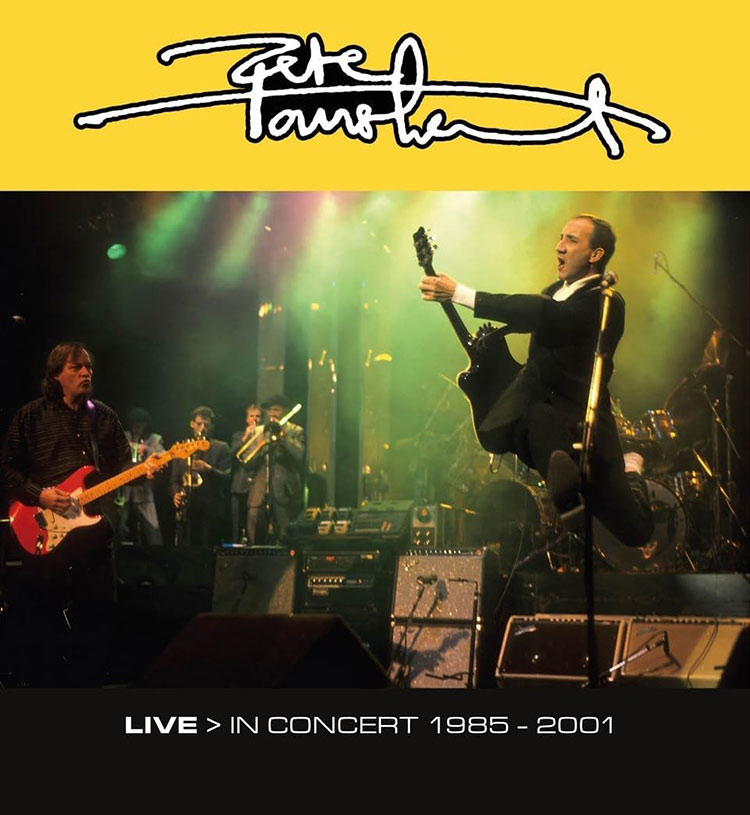
Live in Concert 1985-2001 Pete Townshend /
-
-
CD 1: Brixton Academy 1 & 2 November 1985
- Mary Anne With The Shaky Hand
- Won’t Get Fooled Again
- A Little Is Enough
- Secondhand Love
- That’s Alright Mama
- Behind Blue Eyes
- The Shout
- Harlem Shuffle
- Barefootin’
- After The Fire
- Love On The Air
- Midnight Lover
- Blue Light
- I Put A Spell On You
- I’m One
-
CD 2: Brixton Academy 1 & 2 November 1985
- Driftin’
- Magic Bus
- Save It For Later
- Eyesight To The Blind
- Walkin’
- Stop Hurting People
- The Sea Refuses No River
- Boogie Stop Shuffle
- Face The Face
- Pinball Wizard
- Give Blood
- Night Train
-
CD 3: Brooklyn Academy of Music, Brooklyn, New York 7 August 1993
- Intro
- English Boy
- Meher Baba M3
- Let’s Get Pretentious
- Meher Baba M4 [Signal Box]
- Early Morning Dreams
- I Want That Thing
- Intro : Outlive The Dinosaur
- Outlive The Dinosaur
- Gridlife
- Flame [Demo]
- Now And Then
- I Am Afraid
- Gridlife 2
- Don’t Try To Make Me Real
- Intro : Predictable
- Predictable
- Flame
- Meher Baba M5 [Vivaldi]
- Fake It
- Intro : Now And Then [Reprise]
- Now And Then [Reprise]
- Baba O’Riley [Demo]
- English Boy [Reprise]
-
CD 4: Brooklyn Academy of Music, Brooklyn, New York 7 August 1993
- Pinball Wizard / See Me Feel Me / Listening To You
- Let My Love Open The Door
- Rough Boys
- Behind Blue Eyes
- The Kids Are Alright
- Keep Me Turning
- Eminence Front
- A Little Is Enough
- You Better You Bet
- Face The Face
- Won’t Get Fooled Again / Let’s See Action
- Magic Bus
-
CD 5: Fillmore 30 April 1996
- Let My Love Open The Door
- English Boy
- Drowned
- The Shout
- I Put A Spell On You
- Cut My Hair
- Sheraton Gibson
- I’m One
- Heart To Hang Onto
- Parvardigar
- A Legal Matter
- Let My Love Open The Door
-
CD 6: Fillmore 30 April 1996
- A Friend Is A Friend
- I Am An Animal
- All Shall Be Well
- Slit Skirts
- Eyesight To The Blind
- Driftin’ Blues
- Now And Then
- Rough Boys
- I’m A Boy
- Magic Bus
-
CD 7: The Empire 9 November 1998
- On The Road Again
- A Little Is Enough
- Pinball Wizard
- Drowned
- Anyway, Anyhow, Anywhere
- You Better You Bet
- Behind Blue Eyes
- Baby Don’t You Do It
- English Boy
- Three Steps To Heaven
- Mary Anne With The Shaky Hand
- Sheraton Gibson
- Substitute
- I Am An Animal
- North Country Girl
-
CD 8: The Empire 9 November 1998
- (She’s A) Sensation
- A Friend Is A Friend
- Now And Then
- Let My Love Open The Door
- Who Are You
- The Kids Are Alright
- Acid Queen
- Won’t Get Fooled Again
- Magic Bus
- I’m One
-
CD 9: Live Sadler’s Wells 25 & 26 February 2000
- One Note
- Purcell (Quick Movement)
- Teenage Wasteland
- TIme Is Passing
- Love Ain’t For Keeping
- Goin’ Mobile
- Greyhound Girl
- Tragedy
- Mary
- I Don’t Even Know Myself
- Bargain
- Gettin’ In Tune
- Pure And Easy
- Baba O’Riley – Orchestral
-
CD 10: Live Sadler’s Wells 25 & 26 February 2000
- Baba O’Riley
- Hinterland Rag
- Behind Blue Eyes
- Let’s See Action
- Sister Disco
- Relay
- Who Are You
- Join Together
- Won’t Get Fooled Again
- Tragedy Explained
- The Song Is Over
- Can You Help The One You Really Love?
-
CD 11: La Jolla Playhouse 22 June 2001
- Pinball Wizard
- Let My Love Open The Door
- Heart To Hang Onto
- Cut My Hair
- Slit Skirts
- Drowned
- Greyhound Girl
- Tattoo
- The Sea Refuses No River
-
CD 12: La Jolla Playhouse 22 June 2001
- Saint James Infirmary
- Eminence Front
- Won’t Get Fooled Again
- Behind Blue Eyes
- Won’t Get Fooled Again (Electric)
-
CD 13: La Jolla Playhouse 23 June 2001
- Pinball Wizard
- Let My Love Open The Door
- Heart To Hang Onto
- Cut My Hair
- Slit Skirts
- Drowned
- Greyhound Girl
- Tattoo
- Collings
- Eminence Front
-
CD 14: La Jolla Playhouse 23 June 2001
- Sheraton Gibson
- Won’t Get Fooled Again
- I’m One
- Behind Blue Eyes
- Driftin’ Blues
- Eyesight To The Blind
- Won’t Get Fooled Again (Electric)
-
CD 1: Brixton Academy 1 & 2 November 1985

 Interview
Interview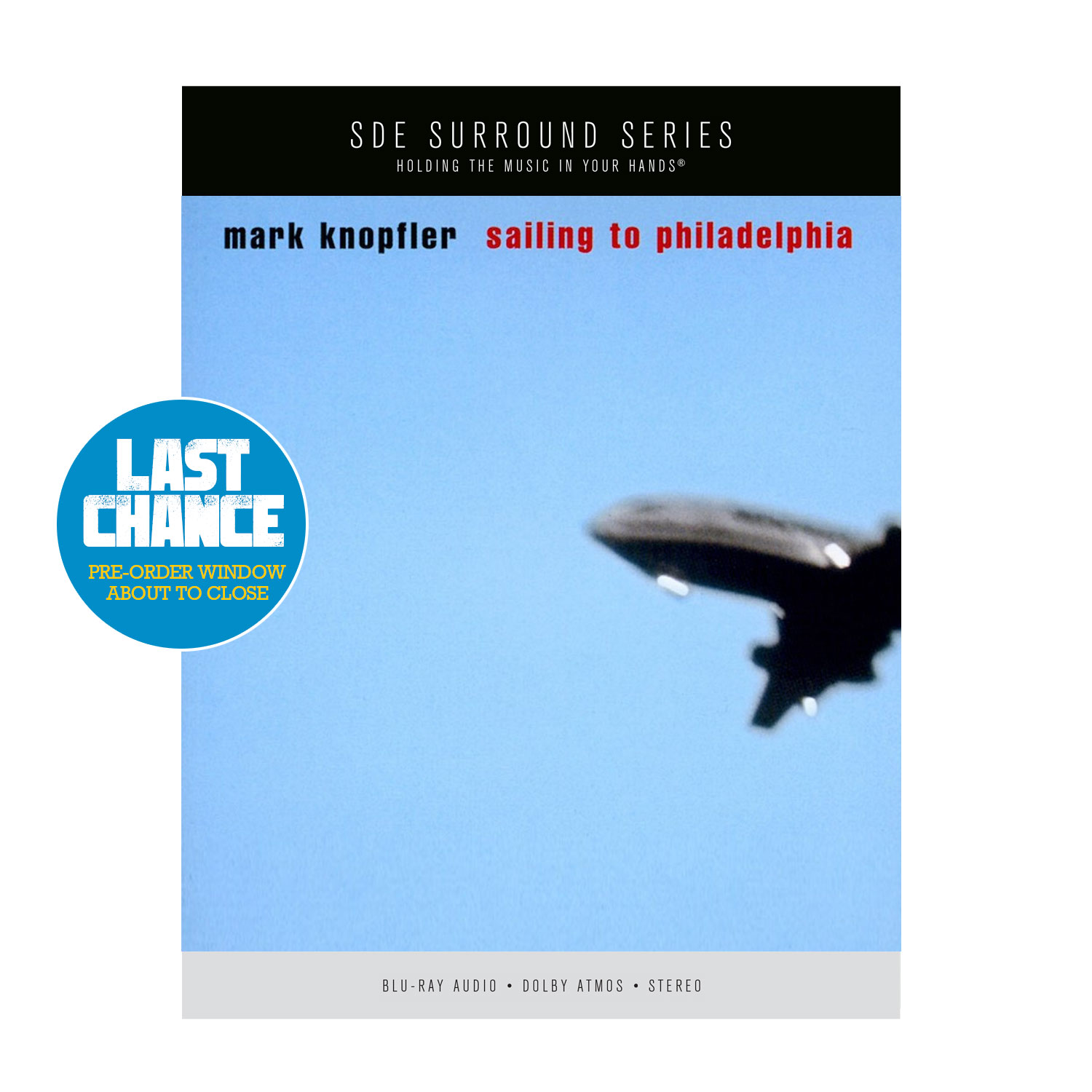
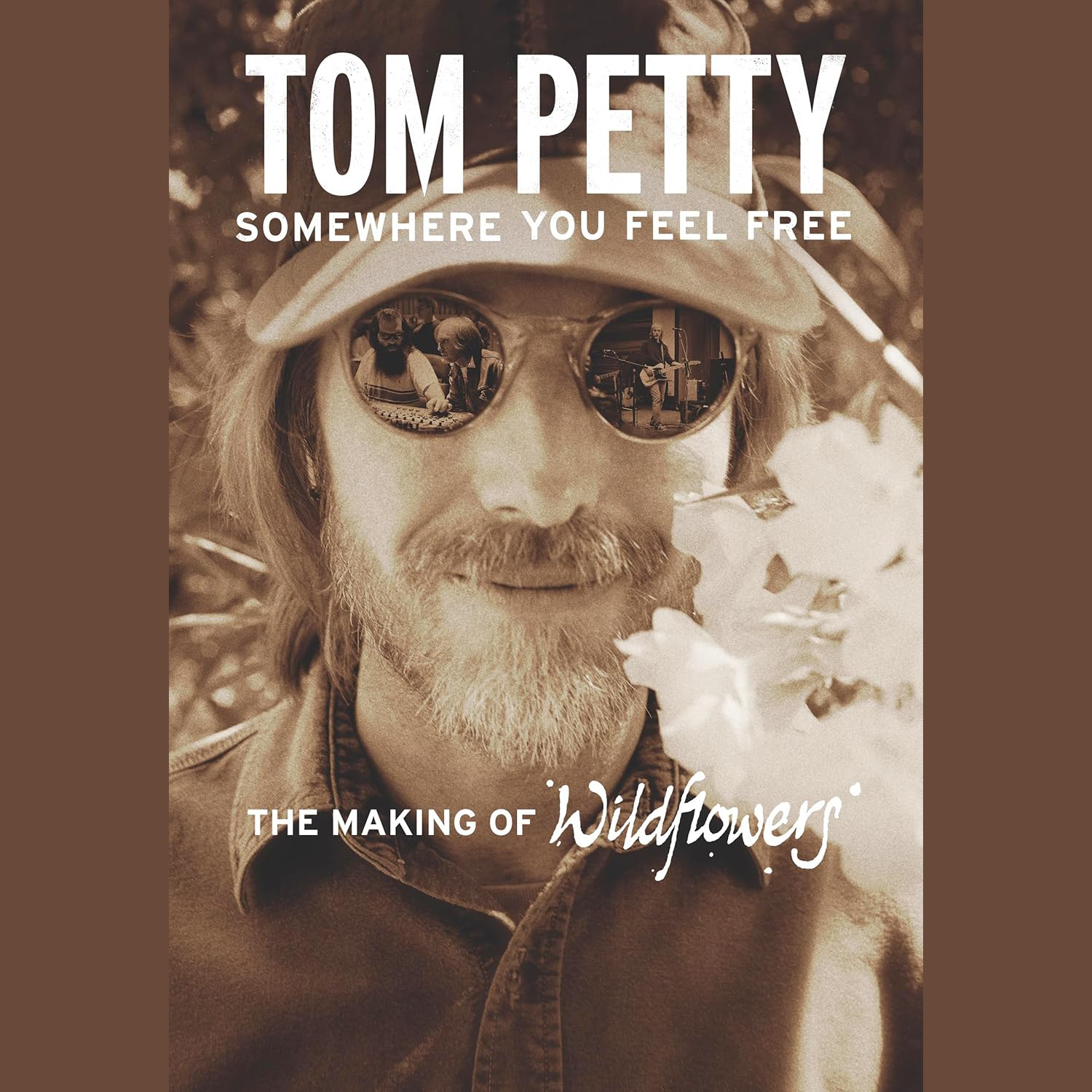
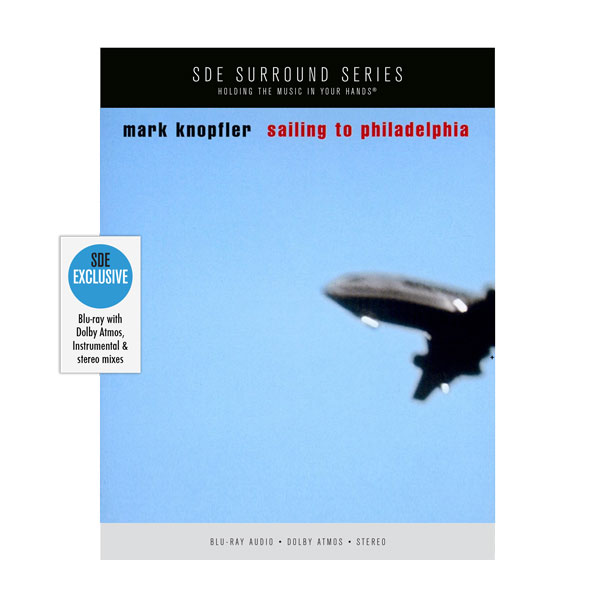
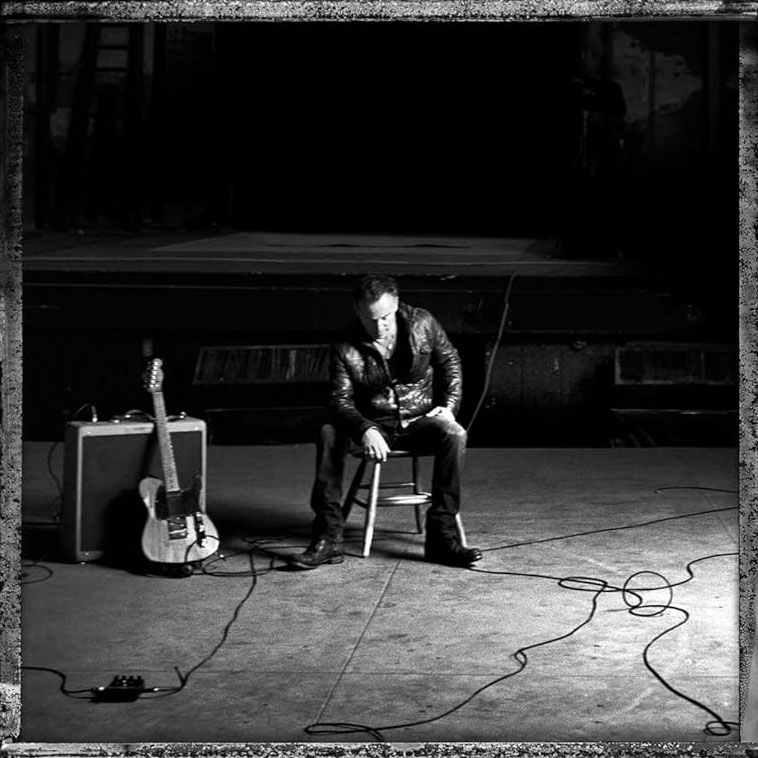
 Reviews
Reviews
By Paul Sinclair
50